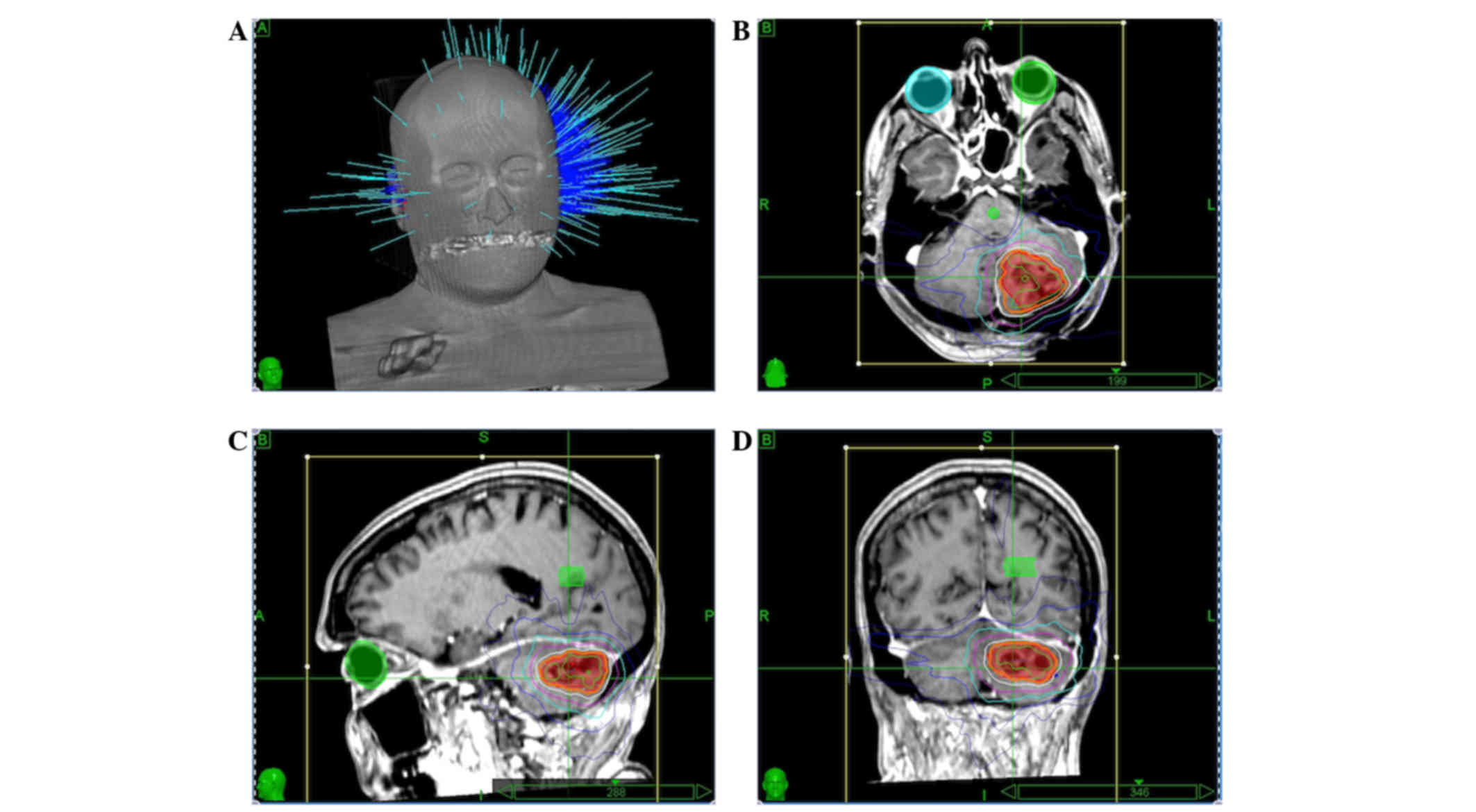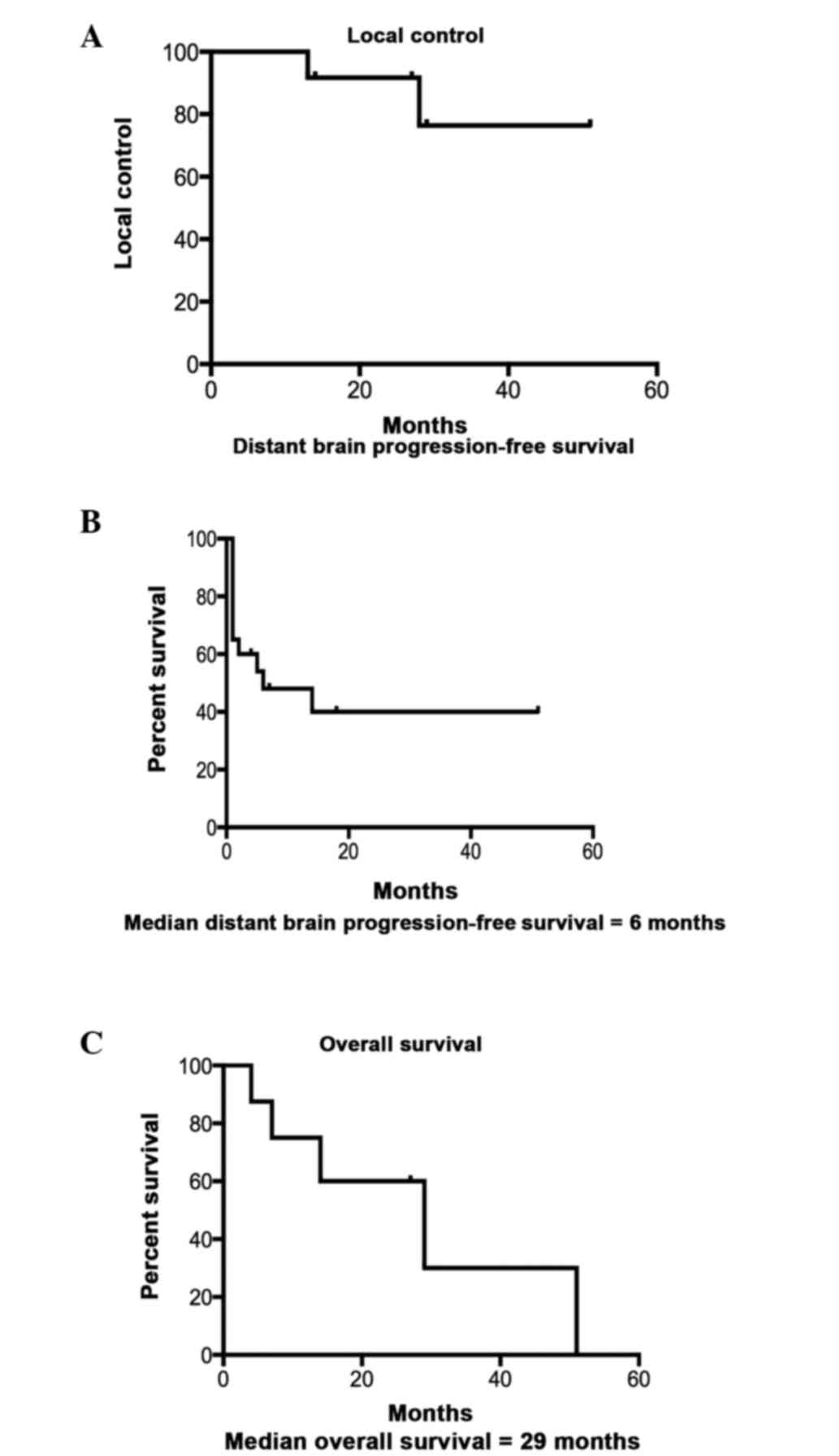|
1
|
Siegel R, Naishadham D and Jemal A: Cancer
statistics, 2013. CA Cancer J Clin. 63:11–30. 2013. View Article : Google Scholar : PubMed/NCBI
|
|
2
|
Jemal A, Bray F, Center MM, Ferlay J, Ward
E and Forman D: Global cancer statistics. CA Cancer J Clin.
61:69–90. 2011. View Article : Google Scholar : PubMed/NCBI
|
|
3
|
Jemal A, Center MM, DeSantis C and Ward
EM: Global patterns of cancer incidence and mortality rates and
trends. Cancer Epidemiol Biomarkers Prev. 19:1893–1907. 2010.
View Article : Google Scholar : PubMed/NCBI
|
|
4
|
Aalders JG, Abeler V and Kolstad P:
Recurrent adenocarcinoma of the endometrium: A clinical and
histopathological study of 379 patients. Gynecol Oncol. 17:85–103.
1984. View Article : Google Scholar : PubMed/NCBI
|
|
5
|
Chura JC, Marushin R, Boyd A, Ghebre R,
Geller MA and Argenta PA: Multimodal therapy improves survival in
patients with CNS metastasis from uterine cancer: A retrospective
analysis and literature review. Gynecol Oncol. 107:79–85. 2007.
View Article : Google Scholar : PubMed/NCBI
|
|
6
|
Ikeda S, Yamada T, Katsumata N, Hida K,
Tanemura K, Tsunematu R, Ohmi K, Sonoda T, Ikeda H and Nomura K:
Cerebral metastasis in patients with uterine cervical cancer. Jpn J
Clin Oncol. 28:27–29. 1998. View Article : Google Scholar : PubMed/NCBI
|
|
7
|
Cordeiro JG, Prevedello DM, da Silva
Ditzel LF, Pereira CU and Araújo JC: Cerebral metastasis of
cervical uterine cancer: Report of three cases. Arq Neuropsiquiatr.
64:300–302. 2006. View Article : Google Scholar : PubMed/NCBI
|
|
8
|
Cormio G, Lissoni A, Losa G, Zanetta G,
Pellegrino A and Mangioni C: Brain metastases from endometrial
carcinoma. Gynecol Oncol. 61:40–43. 1996. View Article : Google Scholar : PubMed/NCBI
|
|
9
|
Root K and Armaghany T: Solitary brain
metastasis in a patient with ovarian cancer with BRCA2 mutation. J
Clin Oncol. 30:e239–e240. 2012. View Article : Google Scholar : PubMed/NCBI
|
|
10
|
Kastritis E, Efstathiou E, Gika D, Bozas
G, Koutsoukou V, Papadimitriou C, Pissakas G, Dimopoulos MA and
Bamias A: Brain metastases as isolated site of relapse in patients
with epithelial ovarian cancer previously treated with platinum and
paclitaxel-based chemotherapy. Int J Gynecol Cancer. 16:994–999.
2006. View Article : Google Scholar : PubMed/NCBI
|
|
11
|
Leath CA III and Straughn JM Jr:
Chemotherapy for advanced and recurrent cervical carcinoma: Results
from cooperative group trials. Gynecol Oncol. 129:251–257. 2013.
View Article : Google Scholar : PubMed/NCBI
|
|
12
|
Vale CL, Tierney J, Bull SJ and Symonds
PR: Chemotherapy for advanced, recurrent or metastatic endometrial
carcinoma. Cochrane Database Syst Rev. 8:CD0039152012.
|
|
13
|
Foley OW, Rauh-Hain JA and del Carmen MG:
Recurrent epithelial ovarian cancer: An update on treatment.
Oncology. 27:288–294. 2013.PubMed/NCBI
|
|
14
|
Rodriguez GC, Soper JT, Berchuck A, Oleson
J, Dodge R, Montana G and Clarke-Pearson DL: Improved palliation of
cerebral metastases in epithelial ovarian cancer using a combined
modality approach including radiation therapy, chemotherapy, and
surgery. J Clin Oncol. 10:1553–1560. 1992.PubMed/NCBI
|
|
15
|
Bruzzone M, Campora E, Chiara S, Giudici
S, Merlini L, Simoni C, Mammoliti S, Rubagotti A and Rosso R:
Cerebral metastases secondary to ovarian cancer: Still an unusual
event. Gynecol Oncol. 49:37–40. 1993. View Article : Google Scholar : PubMed/NCBI
|
|
16
|
Stein M, Steiner M, Klein B, Beck D, Atad
J, Kuten A, Robinson E and Goldsher D: Involvement of the central
nervous system by ovarian carcinoma. Cancer. 58:2066–2069. 1986.
View Article : Google Scholar : PubMed/NCBI
|
|
17
|
Hardy JR and Harvey VJ: Cerebral
metastases in patients with ovarian cancer treated with
chemotherapy. Gynecol Oncol. 33:296–300. 1989. View Article : Google Scholar : PubMed/NCBI
|
|
18
|
Chen YL, Cheng WF, Hsieh CY and Chen CA:
Brain metastasis as a late manifestation of ovarian carcinoma. Eur
J Cancer Care (Engl). 20:44–49. 2011. View Article : Google Scholar : PubMed/NCBI
|
|
19
|
McMeekin DS, Kamelle SA, Vasilev SA,
Tillmanns TD, Gould NS, Scribner DR, Gold MA, Guruswamy S and
Mannel RS: Ovarian cancer metastatic to the brain: What is the
optimal management? J Surg Oncol. 78:194–200. 2001. View Article : Google Scholar : PubMed/NCBI
|
|
20
|
Hu XQ, Imitola J, Kim RY, Mahta A and
Kesari S: Brain metastasis from ovarian cancer: Case report and
review of the literature. Med Oncol. 29:1250–1252. 2012. View Article : Google Scholar : PubMed/NCBI
|
|
21
|
Chang EL, Wefel JS, Hess KR, Allen PK,
Lang FF, Kornguth DG, Arbuckle RB, Swint JM, Shiu AS, Maor MH and
Meyers CA: Neurocognition in patients with brain metastases treated
with radiosurgery or radiosurgery plus whole-brain irradiation: A
randomised controlled trial. Lancet Oncol. 10:1037–1044. 2009.
View Article : Google Scholar : PubMed/NCBI
|
|
22
|
Patchell RA, Tibbs PA, Regine WF, Dempsey
RJ, Mohiuddin M, Kryscio RJ, Markesbery WR, Foon KA and Young B:
Postoperative radiotherapy in the treatment of single metastases to
the brain: A randomized trial. JAMA. 280:1485–1489. 1998.
View Article : Google Scholar : PubMed/NCBI
|
|
23
|
Aoyama H, Shirato H, Tago M, Nakagawa K,
Toyoda T, Hatano K, Kenjyo M, Oya N, Hirota S, Shioura H, et al:
Stereotactic radiosurgery plus whole-brain radiation therapy vs
stereotactic radiosurgery alone for treatment of brain metastases:
A randomized controlled trial. JAMA. 295:2483–2491. 2006.
View Article : Google Scholar : PubMed/NCBI
|
|
24
|
Anupol N, Ghamande S, Odunsi K, Driscoll D
and Lele S: Evaluation of prognostic factors and treatment
modalities in ovarian cancer patients with brain metastases.
Gynecol Oncol. 85:487–492. 2002. View Article : Google Scholar : PubMed/NCBI
|
|
25
|
Shiohara S, Ohara M, Itoh K, Shiozawa T
and Konishi I: Successful treatment with stereotactic radiosurgery
for brain metastases of endometrial carcinoma: A case report and
review of the literature. Int J Gynecol Cancer. 13:71–76. 2003.
View Article : Google Scholar : PubMed/NCBI
|
|
26
|
Elliott KS, Borowsky ME, Lee YC, Rao C and
Abulafia O: Prolonged survival in recurrent endometrial carcinoma
to the brain. Gynecol Oncol. 95:247–251. 2004. View Article : Google Scholar : PubMed/NCBI
|
|
27
|
Chung SB, Jo KI, Seol HJ, Nam DH and Lee
JI: Radiosurgery to palliate symptoms in brain metastases from
uterine cervix cancer. Acta Neurochir (Wien). 155:399–405. 2013.
View Article : Google Scholar : PubMed/NCBI
|
|
28
|
Agrawal A, Kumar A, Sinha AK, Kumar M,
Pandey SR and Khaniya S: Intracranial metastases from carcinoma of
the cervix. Singapore Med J. 48:e154–e156. 2007.PubMed/NCBI
|
|
29
|
Park SH, Ro DY, Park BJ, Kim YW, Kim TE,
Jung JK, Lee JW, Kim JY and Han CW: Brain metastasis from uterine
cervical cancer. J Obstet Gynaecol Res. 36:701–704. 2010.
View Article : Google Scholar : PubMed/NCBI
|
|
30
|
Cooper KG, Kitchener HC and Parkin DE:
Cerebral metastases from epithelial ovarian carcinoma treated with
carboplatin. Gynecol Oncol. 55:318–323. 1994. View Article : Google Scholar : PubMed/NCBI
|
|
31
|
Pothuri B, Chi DS, Reid T, Aghajanian C,
Venkatraman E, Alektiar K, Bilsky M and Barakat RR: Craniotomy for
central nervous system metastases in epithelial ovarian carcinoma.
Gynecol Oncol. 87:133–137. 2002. View Article : Google Scholar : PubMed/NCBI
|
|
32
|
Pectasides D, Aravantinos G, Fountzilas G,
Kalofonos C, Efstathiou E, Karina M, Pavlidis N, Farmakis D,
Economopoulos T and Dimopoulos MA: Brain metastases from epithelial
ovarian cancer. The Hellenic Cooperative Oncology Group (HeCOG)
experience and review of the literature. Anticancer Res.
25:3553–3558. 2005.PubMed/NCBI
|
|
33
|
Lee YK, Park NH, Kim JW, Song YS, Kang SB
and Lee HP: Gamma-knife radiosurgery as an optimal treatment
modality for brain metastases from epithelial ovarian cancer.
Gynecol Oncol. 108:505–509. 2008. View Article : Google Scholar : PubMed/NCBI
|
|
34
|
Monaco E III, Kondziolka D, Mongia S,
Niranjan A, Flickinger JC and Lunsford LD: Management of brain
metastases from ovarian and endometrial carcinoma with stereotactic
radiosurgery. Cancer. 113:2610–2614. 2008. View Article : Google Scholar : PubMed/NCBI
|
|
35
|
Niu X, Rajanbabu A, Delisle M, Peng F,
Vijaykumar DK, Pavithran K, Feng Y, Lau S, Gotlieb WH and Press JZ:
Brain metastases in women with epithelial ovarian cancer:
Multimodal treatment including surgery or gamma-knife radiation is
associated with prolonged survival. J Obstet Gynaecol Can.
35:816–822. 2013. View Article : Google Scholar : PubMed/NCBI
|
















